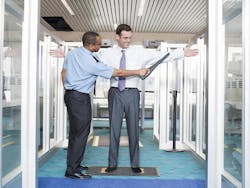TSA airport security experts eye $99 million program for enabling technologies to speed passenger screening
WASHINGTON – U.S. airport security experts are kicking-off a $99 million five-year program to more than double the speed of screening passengers and their carry-on baggage over today's screening rates.
Officials of the U.S. Transportation Security Administration (TSA) in Washington released an open broad agency announcement (70RSAT22RB00000001) this week for the Screening at Speed program.
This initiative seeks to develop enabling technologies to increase the speed of passenger and carry-on baggage screening from today's 50 to 150 passengers per lane per hour, to as fast as 300 passengers per hour at each security lane at major U.S. airports.
This initiative will be available for industry bids over the next five years. TSA experts are not taking bids now, but will ask for industry proposals in a series of specific technology calls over the duration of the program.
Evolving airport security threats have created a need for technological improvements to screen the growing number of people who pass through airport security checkpoints each year, TSA officials explain.
The Screening at Speed program seeks not only to develop and deploy technologies to bolster aviation security while speeding-up the rate of passenger screening, but also to reduce the number of false alarms that today's screening equipment can generate.
The goal of Screening at Speed is to develop and demonstrate faster and more robust passenger and carry-on baggage screening technologies by detecting threats at TSA’s highest standards; screening more than 300 people per lane per hour; screening people without the need for them to remove coats, shoes, belts, or hats; screening liquids, aerosols, gels, powders, and electronics without removing them from passenger bags; lifting restrictions on the quantity and size of liquids, aerosols, gels, and powders that passengers can carry on; and significantly reducing false alarms.
In addition, TSA officials want the ability to integrate future third-party technology upgrades into passenger-screening equipment as these new technologies become available.
TSA officials say they expect technology topics of the Screening at Speed program to include:
-- passenger analysis;
-- video analytics;
-- integrated sensing and data fusion;
-- risk-based security;
-- identity verification and credential authentication;
-- passenger screening;
-- millimeter wave (active or passive);
-- terahertz wave;
-- enhanced metal detection;
-- automatic threat recognition;
-- radio frequency material characterization;
-- property screening;
-- computed tomography x-ray;
-- phase contrast imaging;
-- x-ray diffraction;
-- computed tomography reconstruction;
-- prohibited items detection algorithms;
-- explosive detection algorithms;
-- non-X-ray sensors like neutron imaging;
-- system architecture and integration;
-- open interfaces and algorithms;
-- curb-to-gate sensing;
-- network interconnects and data topology;
-- data storage and curation;
-- data fusion algorithms;
-- seamless concepts of operations, passenger self-screening;
-- image processing and human systems;
-- enabling capabilities;
-- trace explosives detection (contact or non-contact);
-- bulk explosives detection;
-- user interfaces including augmented/virtual reality;
-- synthetic data generation;
-- rapid response and emerging threat mitigation;
-- process optimization and officer evaluation;
-- test and evaluation;
-- explainable artificial intelligence and machine learning; and
-- automated test beds.
Submit questions or concerns by post or courier to John Fortune, manager of the Screening At Speed program, 245 Murray Lane, #0200, Washington, D.C. 20528; Carolyn Lethert, contracting officer, 301 7th Street, SW, RM 3051, Washington, DC 20528-0115; or Jennifer K. Koons, contract specialist, 301 7th Street, SW, RM 3051, Washington, DC 20528-0115.
More information is online at https://sam.gov/opp/70015ebaa5e041f3821c09837649df9f/view.
About the Author
John Keller
Editor-in-Chief
John Keller is the Editor-in-Chief, Military & Aerospace Electronics Magazine--provides extensive coverage and analysis of enabling electronics and optoelectronic technologies in military, space and commercial aviation applications. John has been a member of the Military & Aerospace Electronics staff since 1989 and chief editor since 1995.
